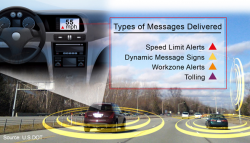
— Talking cars are on the way, at least in a language the vehicles will understand. The National Highway Traffic Safety Administration (NHTSA) is moving forward on vehicle-to-vehicle (V2V) communication technology for light vehicles.
V2V technology would allow vehicles to "talk" to each other in an effort to avoid crashes, especially rear-end, lane change, and intersection accidents. The vehicles will exchange data such as speed and vehicle position at a rate of 10 times per second.
The Benefits of Chatty Vehicles
According to NHTSA, V2V-equipped vehicles can provide the driver with 360-degree situational awareness to notice crash situations and detect threats hundreds of yards from other vehicles that cannot be seen. Examples include a driver who needs to decide if it is safe to pass on a two-lane road, make a left turn across the path of oncoming traffic, or avoid a vehicle approaching at an intersection.
In August, 2012, the government initiated a test of the technology using 3000 vehicles in Ann Arbor, Michigan. Eight automakers were involved: Ford, General Motors, Honda, Hyundai-Kia, Mercedes-Benz, Nissan, Toyota, and Volkswagen.
About 2,500 cars had the technology built-in, while 300 cars used aftermarket devices. The rest of the vehicles using aftermarket devices included motorcycles, buses, and commercial trucks.
A Vision for the Future
The ultimate goal is a day when self-driving cars rule the road, but for now, the upcoming technology will only provide warnings to a driver. Those warnings could come in the form of vibrating seats, audible alarms and graphics in the instrument panel, or LED lights across the bottom of the windshield.
"V2V crash avoidance technology has game-changing potential to significantly reduce the number of crashes, injuries and deaths on our nation's roads," said NHTSA Acting Administrator David Friedman. "Decades from now, it's likely we'll look back at this time period as one in which the historical arc of transportation safety considerably changed for the better, similar to the introduction of standards for seat belts, airbags, and electronic stability control technology."
Considering many people do not trust the government, NHTSA is working to assure the public the signals from cars will be anonymous. The government says there will be no recording or exchanging of personal information and no vehicle will be tracked. Furthermore, the V2V system they have in mind will allegedly have several layers of security to protect privacy and guard against hackers.
How Much Will it Cost You?
Although people who drove the test vehicles seemed to like the technology overall, the price we might pay could be a sticky issue. It's expected the new gadgetry will cost about $2000 per vehicle, but most people said they wouldn't pay more than $250 for the entire package.




